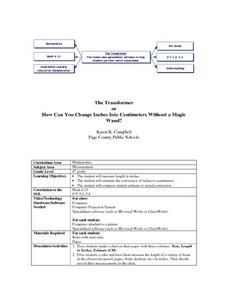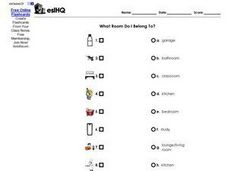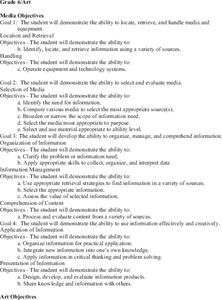Curated OER
Classifying Rocks
Students classify rocks into groups after they observe the rocks and identify properties that can be used to divide them into groups. They then identify other properties that could be used to classify other objects into groups.
Curated OER
Silly Science
In this science activity, students use the dichotomous key to identify common objects listed on the sheet. Then they write the scientific name of each object.
Curated OER
How Does Radon Get Into Your Home?
Students examine their home and calculates the amount of ventilation found. They also compute the surface area of different objects. They determine what is needed to reduce the amount of radon entering the home.
Curated OER
How Does Radon Get Into Your Home?
Students complete an experiment in which they measure the radon level in their home. They examine the different types of units of measurement and practice using them throughout the activity. They calculate surface area on objects as well.
Curated OER
Density, Iron, and Anemia
Students explain what factors determine density. In this physics lesson plan, students hypothesize which objects are less dense. They cite the importance of density in everyday life.
Curated OER
Math: A Geometric Neighborhood
Students, as a final project, draw a picture of their ideal neighborhood on a sunny day. In addition to the sun, their drawings include homes, trees, streets, and selected objects. Each object in their drawing has a written description...
Curated OER
Newton’s Laws of Motion
Eighth graders explore the three laws of motion. In this physics lesson, 8th graders observe teacher demonstration and explain what happened in terms of Newton's Laws. They complete worksheet at the end of the lesson.
Curated OER
Air Quality and Transportation
Second graders study about air pollution and the effects it has on our Earth. Students tally cars on a sheet that has been categorized as follows: One person in car, two persons in car, or three or more persons in car. Students go to...
Curated OER
Types of Reactions
In this reactions worksheet, high schoolers describe combustion as either exothermal or endothermal. Students balance reactions and label the types of reactions. This worksheet has 1 multiple choice, 2 short answer, and 10 problem...
Curated OER
The Transformer
Fourth graders practice measuring different objects in inches. Individually, they estimate the length of the same object in centimeters and then calculate the actual length. They compare and contrast their estimate to the actual length...
Curated OER
Native Americans - People of the Plains
Students explore Plains Indians and practice computer skills by reading creation and migration stories on People of the Plains CD-ROM, and watching Plains video. Students examine village life of Plains Indians, and view different...
Curated OER
Solar System Distance Activity
Learners examine the distances between the Sun, planets, and smaller objects in the Solar System. They design a model using beads that shows the scale distances of the Solar System using astronomical units converted into a 10 centimeter...
Curated OER
Somewhere in the World . . . .
Learners, in groups, choose a country. On the surface of an inflated balloon, they draw/write information (geographic and otherwise) about the country. To finish the project, they make a basket for the balloon and then give a 2-3...
Curated OER
Creating A Professional Newsletter
Students orally explain the following desktop terminology: nameplate, pullquote. Students write a paragraph on "How To Insert A Symbol & Special Characters" Students demonstrate how use the format painter button. Students design a...
Curated OER
Using Pictures to Promote Conversation
Students initiate and sustain a conversation of three or more exchanges on a topic while exploring a collection of large photographs pertaining to that topic. The teacher creates a comfortable setting and provide a variety of books...
Curated OER
Halloween Match
For this Halloween word worksheet, students examine 5 pictures of Halloween objects. Students read the riddles in another column, write the answer and then match it to the picture it describes.
Curated OER
What Room Do I Belong To?
In this ESL rooms in a house vocabulary worksheet, learners analyze 7 pictures that depict common objects. Students match each picture to the room in the house where it might be found.
Curated OER
Adjectives
In this ESL adjectives worksheet, students analyze 7 pictures that depict objects of different sizes and shapes. Students match these pictures with the adjectives that describe them.
Curated OER
Sculpture
Sixth graders explore the art of sculpture. They examine the sculptural techniques that can be used. Students select sculptural materials, tools, and techniques to create a novel interpretation of an everyday object.
Curated OER
School Forest Lesson- Looking at Literature
Students compare what they learned though literature to the school forest. In this environment lesson, students visit the forest surrounding their school to listen to literature and identify objects in nature. Students create a...
Cornell University
The Physics of Bridges
Stability is key when building a bridge. Scholars explore the forces acting upon bridges through an analysis of Newton's Laws and Hooke's Law. The activity asks individuals to apply their learning by building a bridge of their own.
Curated OER
Investigating Newton's Second Law Of Motion
Students participate in a lesson that investigates Newton's Second Law of Motion. They conduct an experiment of observing balls that are rolled down a ramp. The lesson includes background information for the teacher for preparation and...
EngageNY
Why Are Vectors Useful? 1
How do vectors help make problem solving more efficient? Math scholars use vectors to represent different phenomenon and calculate resultant vectors to answer questions. Problems vary from modeling airplane motion to the path of a...
Curated OER
Volume of Solid Figures
Learners calculate volume using the correct formula and the correct unit. They explore different prisms, spheres, cubes, and cones as they calculate volume and relate it to depths in oceans.























